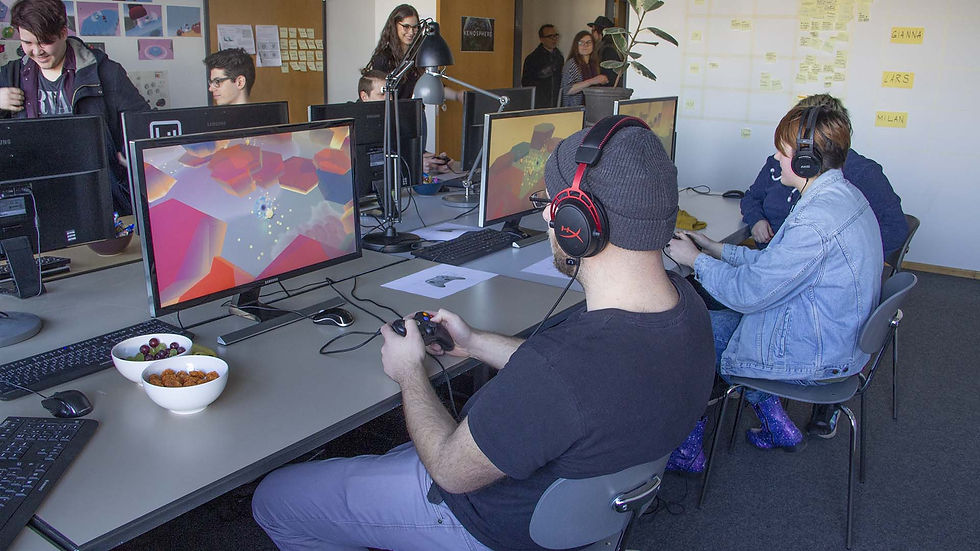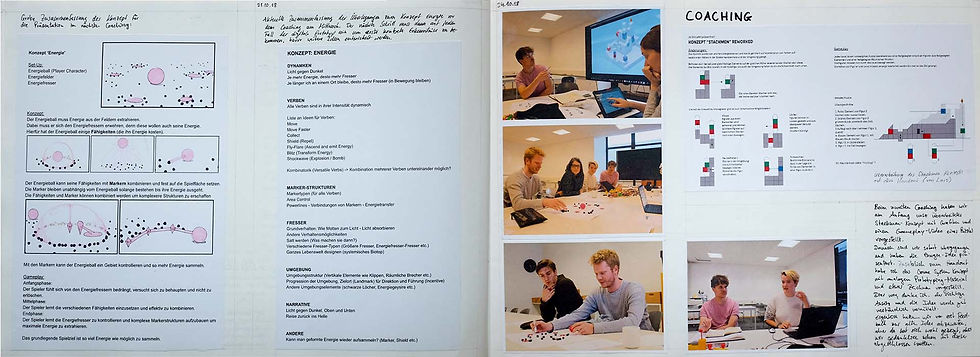
XENOSPHERE
Xenosphere is a game about a celestial energy sphere which explores a strange and mysterious world in search for precious lifeforce. In the inevitable battle for resources the player will unleash a variety of powerful actions to fight off vast amounts of relentless enemies and take control over the environment by building complex energy structures.
MY TASKS:
Game Design
System Design
Level Design
Development
genre: 3rd-Person Action & Tactics — team size: 4 — time frame: 3 months (3rd semester, HTW Berlin)
RESPONSIBILITIES
Game Design
-
Creating the initial concept by mixing gameplay from different genres including exploration, tactical combat, resource management and structure building
-
Designing a set of 4 distinct actions with direct impact on gameplay, as well as a structure counterpart for each of them
-
Establishing a tense play experience and promoting interesting choices by providing multiple options to deal with challenges
System Design
-
Developing an interconnected energy system, supporting energy storage, modular usages, transfer mechanisms and a detection process
-
Setting up the power progression of the player character which dynamically scales the strength of abilities depending on the sphere’s energy volume
-
Balancing the parametrization of the power progression, structure interactions and the enemy spawning system
Level Design
-
Prototyping and testing different game spaces and gameplay goals
-
Designing level modules with varying spacial arrangements, resource distributions and enemy spawn positions
-
Creating a linear tutorial sequence that teaches all mechanics gradually
-
Building the final level including the tutorial, an open mid section and a final mountain
Development
-
Being responsible for all programming tasks
-
Developing the modular parts of the complex energy system in C# and putting the elements together in the Unity engine
-
Setting up and building playable prototypes throughout development
-
Working on the technical aspects of visual effects from particle systems to dynamically altering geometry and shaders

Visualizing the early concept with prototyping material at presentation

Early prototype with procedurally generated elements

Playtesting at exhibition

Visualizing the early concept with prototyping material at presentation
Development Process Impressions
LEARNINGS
I gained a tremendous amount of game design insights from working on this project. For the most part because I did so many things the wrong way. For once, I crammed too many ideas into the initial concept and believed in it without any real proof of concept. When complications inevitably arrived, I didn’t have the mental flexibility to really adjust the design properly. In hindsight, this taught me to leave early design specifications more open and work iteratively with plenty of room for potential adaptation.
Similarly, I made many mistakes designing the game’s systems. They were generally too complicated, abstract and interconnected. Having the same resource for everything and using complicated functions for many mechanisms turned out to be difficult to comprehend, work with and balance effectively. I learned that I should model systems and mechanisms as simply as possible and provide some level of separation between subsystems to ensure a high degree of design control.
The biggest issue with the game, however, was that players had a hard time understanding it. Mechanics like energy storage and action costs weren’t well communicated and the benefits of structure building were unintuitive. The visuals and narrative were so foreign and unrelatable to players that even the gameplay goal seemed unclear. This experience made me realize just how important it is to clearly communicate what is happening in the game and to keep some level of relatable narratives and mechanics to ensure players feel comfortable with engaging innovative gameplay.

First game concept presentation (plus earlier concept that was scrapped)

Designing the fundamental energy system

Level design progression of tutorial sequence

First game concept presentation (plus earlier concept that was scrapped)
Dev Diary Impressions